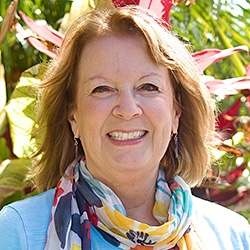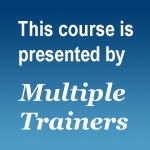

Search Results: awareness
-
In this telecourse recording, you will learn and practice self-awareness skills to fine tune your attention to met needs; savoring feelings of well-being; expressing these feelings to others; and receiving other people's messages of joy, gratitude, inspiration and more!
-
In this brief audio segment, Miki works with a woman whose teenage daughter rejects her use of NVC, guiding her in a process of self-awareness and acceptance.
-
Building your body and mind awareness can help you better regulate/calm your emotions. Regular self-empathy will help you better regulate your emotions as well as increase your body and mind awareness. If you are not aware of amygdala activation (fight/flight/freeze response), you will react instead of responding with choice. Use this eight-step process to develop your self-empathy/regulation skills.
-
-
Observation is the awareness of our sensory perceptions and thoughts, separate from evaluations and judgments. Feeling involves bodily sensations and emotions, distinct from "faux feelings" that mix thought and emotion. Needs encompass universal human requirements for survival and wellness, while thoughts and evaluations express needs. Requests are rooted in connection and invite true willingness, rather than demanding compliance.
-
Observation is the awareness of our sensory perceptions and thoughts, separate from evaluations and judgments. Feeling involves bodily sensations and emotions, distinct from "faux feelings" that mix thought and emotion. Needs encompass universal human requirements for survival and wellness, while thoughts and evaluations express needs. Requests are rooted in connection and invite true willingness, rather than demanding compliance.
-
Jim and Jori offer a tip to stay present in the face of our reactivity to witnessed conflict.
-
Join LoraKim Joyner to investigate how merging science, the social and emotional intelligence of humans, animals and other species and Nonviolent Communication can bring a greater sense of belonging and wholeness to your life, and care and justice to the lives of others.
-
Grow your compassionate presence with this 3-process exercise. The processes include: Connecting to and feeling the Life Impulse meditation, Creating your own inner space of compassionate presence exercise, and the Compassionately Embracing visualization. These processes will guide you toward deeper self connection and compassionate presence.
-
Self-compassion is essential for healing trauma and restoring your wholeness. It is also an antidote to reactivity and separation, allowing presence to emerge.
In developing presence, you can become what the world needs most in these times of intensity and chaos. This work can strengthen your skills to be more fully in relationship with all that life offers while allowing your heart to be moved by what is alive in you and with others
-
When Dian works with managers, they often ask how they can manage others more effectively. She almost always asks them: how are you managing yourself?
This question applies to all aspects of life, both at work and at home. How are you: 1) gaining clarity around your needs; 2) managing your internal reactions; and 3) clarifying your requests before you open your mouth (or judge) others? This is why self-empathy – which Dian calls “self-management,” now a buzzword in business – is central to the practice of Nonviolent Communication.
Yet self-empathy is not always easy, especially if events in your life stimulate old, “fossilized” needs. These “fossilized” needs are often precognitive and connected to trauma, and as a result, “live” in your muscle memory. In order to fully release this “stuck” energy, it is necessary to engage your felt-sense while learning to empathize with your body and deeply connect with your younger parts.
Dian calls this process Somatic Self-Empathy (SEE).
-
Here's a five-step 30 day practice to cultivate gratitude, using the practice of observations, needs, feelings, presence, vitality, awareness of contribution, sharing power and interdependence.
-
Let's look at the resources, awareness, and skills needed to ask for emotional attunement, celebration, relatedness, perspective, understanding, advice, and information. This includes expressing appreciation for what's supporting your needs, strengthening a sense of worthiness, and awareness of your reactivity and intention. Plus, making requests that are clear, specific, doable and creates a heart connection with others.
-
In moments where we would like to see change, personal growth or spiritual transformation, rather than immediately acting to make a change, Robert suggests we practice unconditional self-acceptance through a spacious presence to our inner experience. Robert asks us to give our attention and spacious awareness to our own judgments, inner contractions, and other experiences we often regard as undesirable.
-
Trainer Tip: Knowing the difference between what we need and what we want someone else to do about that need can have a profound impact on our relationships and our happiness.
-
This telecourse recording gives NVC Practitioners a guided tour of Ken Wilber’s work, a meta-theory (theory of theories) that includes as much knowledge and wisdom from as many sources as possible. You will explore how NVC and Integral Framework mesh, overlap and complement each other.
-
Join Sylvia and Jean in this fascinating exploration of NVC and the Enneagram, a system of nine basic personality types.
-
This exercise explains four stages of the "Need Cycle": Fulfilled, Emerging, Urgent, Satisfying. It asks us to consider, connect and identify needs, feelings and where we are in the Need Cycle. Then it prompts us to remain mindful of the need for sustenance as we move through the cycle, noticing the subtle shifts in your physical sensations and emotions.
-
Roxy Manning emphasizes positive relationships in parenting, highlighting acceptance, understanding, and compromise. She stresses the importance of being aware of one's needs, attuning to the other person's needs, fostering trust, and encouraging open communication, especially with children. The approach involves a balance between meeting both sets of needs for a healthier dynamic.
-
- Learn how to transform NVC into a tool for systemic awareness and healing
- Examine the influence of difference, and uncover pathways that strengthen its capacity
- Learn to receive and offer feedback on impact in situations fraught with power differences
- Explore specific ways in which NVC systemically supports the full flowering of humanity
- Delve into the dynamics of cultural differences, and discover how NVC can systemically contribute to a liberation perspective

Quick Links
Subscription Preferences
Stay In Touch!
Looking for ways to keep up with NVC Academy news, get special offers, free resources, or words of inspiration? Here are five ways to stay engaged:

















